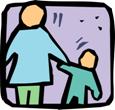

Alzheimer Hot Line
1-800-272-3900
Open 24 Hours a Day
JOAN’S BLOG – WEDNESDAY/THURSDAY, SEPTEMBER 3/4, 2008 – OUR SPOUSES – OUR CHILDREN
This subject keeps coming up on the Message Boards and in e-mails, and I feel it is so important that it needs to be addressed comprehensively in one place – here in a blog.
Childlike behavior by our adult spouses– pouting, whining, throwing temper tantrums, living in the “me” stage, behaving badly only in front of us, wanting things NOW, shadowing – this is just the short list, but it is enough for you to nod your head while reading it and say, “YES. YES. All of that. It DRIVES ME CRAZY
by our adult spouses– pouting, whining, throwing temper tantrums, living in the “me” stage, behaving badly only in front of us, wanting things NOW, shadowing – this is just the short list, but it is enough for you to nod your head while reading it and say, “YES. YES. All of that. It DRIVES ME CRAZY . I don’t know how to handle it.
. I don’t know how to handle it.
But the sad truth is – you DO know how to handle it. You HAVE handled it. In bringing up your children. None of us wants our marital relationship to change from partnership to parenting
to parenting , but Alzheimer’s Disease leaves us no choice. We have had many message board discussions and blog topics talking about the emotional difficulties
, but Alzheimer’s Disease leaves us no choice. We have had many message board discussions and blog topics talking about the emotional difficulties of being forced to transition from spouse to parent/caregiver. The emotional sorrow involved in that transition never leaves, but today, I want to focus on handling the practical matters of that transition.
of being forced to transition from spouse to parent/caregiver. The emotional sorrow involved in that transition never leaves, but today, I want to focus on handling the practical matters of that transition.
Many of you are concerned about the 7 stages of Alzheimer’s Disease and in which stage your spouse fits. Learning about those stages helps us prepare for what is ahead. But I do not think they help us COPE with the behaviors. In order to learn coping strategies, it is vital to remember what Alzheimer’s Disease is. Through this website, newspaper articles, and radio interviews, I have tried to educate the public that Alzheimer’s Disease is a destructive regressive brain disease , not just a memory disease
, not just a memory disease . Alzheimer patients go through all of the child developmental stages again, but BACKWARDS. Once we comprehend that fact, we can have a better understanding of how to handle those “drive me up the wall” behaviors. It is not my intention to insult, denigrate, or offend the Alzheimer patient by comparing him/her to a child. It is simply a sad fact of Alzheimer’s Disease, a fact that none of us can change, that AD patients’ behaviors DO follow the pattern of childhood behaviors – in reverse, and the lives of both spouses can benefit from strategies that reduce tension in dealing with those behaviors. From “Retrogenesis theory in Alzheimer’s disease: Evidence and clinical implications*” -(http://www.um.es/analesps/v22/v22_2/11-22_2.pdf ) “Current research has been focused on eluci-dating this process of “returning to childhood” that has been anecdotally documented to occur in patients with de-mentia of the Alzheimer’s type and vascular dementia. This research suggests that degenerative mechanisms reverse the order of acquisition in normal human development. The process is known as retrogenesis (Reisberg, et al., 1999a) and involves functional, behavioral, cognitive, and neurologic degeneration, as well as to the neuropathologic changes that occur in AD. This process of retrogenesis is so robust that the stages of AD can be translated into corresponding developmental ages (DAs). This is important because an awareness of a pa-tient’s current developmental age can assist in providing ap-propriate management and care.”
. Alzheimer patients go through all of the child developmental stages again, but BACKWARDS. Once we comprehend that fact, we can have a better understanding of how to handle those “drive me up the wall” behaviors. It is not my intention to insult, denigrate, or offend the Alzheimer patient by comparing him/her to a child. It is simply a sad fact of Alzheimer’s Disease, a fact that none of us can change, that AD patients’ behaviors DO follow the pattern of childhood behaviors – in reverse, and the lives of both spouses can benefit from strategies that reduce tension in dealing with those behaviors. From “Retrogenesis theory in Alzheimer’s disease: Evidence and clinical implications*” -(http://www.um.es/analesps/v22/v22_2/11-22_2.pdf ) “Current research has been focused on eluci-dating this process of “returning to childhood” that has been anecdotally documented to occur in patients with de-mentia of the Alzheimer’s type and vascular dementia. This research suggests that degenerative mechanisms reverse the order of acquisition in normal human development. The process is known as retrogenesis (Reisberg, et al., 1999a) and involves functional, behavioral, cognitive, and neurologic degeneration, as well as to the neuropathologic changes that occur in AD. This process of retrogenesis is so robust that the stages of AD can be translated into corresponding developmental ages (DAs). This is important because an awareness of a pa-tient’s current developmental age can assist in providing ap-propriate management and care.”
I have condensed the childhood developmental stages into a few basic ones to give you the general idea. At the end, I have listed website resources if you wish to read more in depth information.
Developmental Stages, Behaviors, and Coping Strategies
Adult – this is the person we fell in love with and married – understands abstract ideas; possesses deductive reasoning; understands consequences of actions; verbally fluent; capable of empathy; cognition and memory in tact.
– this is the person we fell in love with and married – understands abstract ideas; possesses deductive reasoning; understands consequences of actions; verbally fluent; capable of empathy; cognition and memory in tact.
Teenage Stage =impulsive; intense; immediate (wanting everything NOW); indestructible (thinking nothing can hurt them); moody; messy; ME centered – difficulty with empathy for others. I flunked “how to handle a teenager”, and none of the expert advice worked for me, but when it comes to your AD spouse:
=impulsive; intense; immediate (wanting everything NOW); indestructible (thinking nothing can hurt them); moody; messy; ME centered – difficulty with empathy for others. I flunked “how to handle a teenager”, and none of the expert advice worked for me, but when it comes to your AD spouse:
Expect impulsivity in words and actions – those Alzheimer cards explaining their condition to strangers who witness this behavior are recommended.
Pick your battles – ignore or clean up the mess yourself – they are not going to respond to constant reminders – they can’t remember them
Moodiness and ME-ness – ignore it.
Indestructible syndrome – Keep them as safe as possible; put away the knives; get rid of the guns; give away the power tools.
Two Year old stage = no deductive reasoning; you cannot reason with a 2 year-old – they have not developed the capacity. Advice from www.kidsgrowth.com:
= no deductive reasoning; you cannot reason with a 2 year-old – they have not developed the capacity. Advice from www.kidsgrowth.com:
"Do not waste your time and breath arguing or reasoning with a 2-year-old . Long speeches of explanation are completely useless………Encourage your 2-year-old to make choices whenever possible, but the choices should be limited to those you can live with ("red shirt or green shirt.") Never ask a 2-year old an open question ("Do you want to take a bath") unless you are willing to accept the answer…………. Provide alternatives. If your 2-year old is playing with something you do not want him or her to have, replace it with another object or toy that your child enjoys………. This avoids a fight and does not place children in a situation where they'll say "no……. Avoid power struggles. No one wins! The 2-year-old still uses the temper tantrum as a weapon against parents. These occur when the child is angry, tired, frustrated or does not get his or her way. Again, handle temper tantrums with the two I's of discipline - ignore or isolate (time out!)."
Two Year old stage – AD related – Substitute AD patient for 2 year-old in the above paragraph, and now you know what you are dealing with. Obviously, time out is not going to work with an AD patient, but ‘WALK AWAY; IGNORE; GO OUTSIDE AND PULL WEEDS; CLOSE YOURSELF IN THE BATHROOM AND YELL, BUT DO NOT ARGUE. They do not have the reasoning ability for argument.
Infant = simple reflex activity; eating; sleeping; total incontinence= end stage AD – 24 hour nursing care
= simple reflex activity; eating; sleeping; total incontinence= end stage AD – 24 hour nursing care
I know this was probably distressing to read, but my only intention was to give you a better understanding of the behaviors your AD spouse is exhibiting and perhaps some useful information in coping with them. This “regressive” phenomenon gave me a much clearer explanation and understanding of AD behaviors.
If anyone is interested in delving deeper into the research, below is a selection of sites for you to visit:
http://www.childdevelopmentinfo.com/development/piaget.shtml
http://www.essortment.com/all/stagechilddeve_retg.htm
http://www.um.es/analesps/v22/v22_2/11-22_2.pdf
http://www.bigtreemurphy.com/MenuPhysical%20Care.htm
Feedback to joan@thealzheimerspouse.com
 View Printer Friendly Version
View Printer Friendly Version
The material included on this website contains general information intended as information only. This site is not intended to provide personal, professional, medical, or psychological advice, and should not be relied upon to govern behavior in any certain or particular circumstances. The opinions in the blogs are solely those of the owner of the website. The opinions on the message boards are not necessarily endorsed by the owner of this website, and are the opinions of those persons writing the messages. All material on this web site is for demonstration and informational purposes only.
The Alzheimer Spouse LLC 2009 All Rights Reserved

Custom Search
|



























